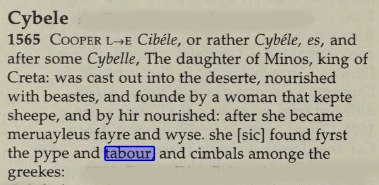England: history of the pipe and tabor
the 16th century
under construction
| In the 16th century neither terminology nor spelling were fixed.
So a pipe and tabor player could be, for example, a mynstrell, a musician, a drummer, a pyper, taber and piper, tabret, taberette or a fidler. It is impossible to know now which of some of these are taborers or players of other instruments as seen in contemporary images. |
|
" There sate dame musyke with all her mynstralsy 'Dictionary of Middle English Musical Terms'.Carter, H.H. (1961/1980) Indiana University Press, Bloomington. Reprinted (1980). |
1518 dispute over processions of workmen at harvest time etc.in Gloucestershire, led by town's 'tabourer', The National Archive GBR/B/8/7 Town Clerk’s legal papers |
1565 dictionary  ‘An early music dictionary : musical terms from British sources, 1500-1740’
by Strahle, Graham 1995 ‘An early music dictionary : musical terms from British sources, 1500-1740’
by Strahle, Graham 1995 |
1565 Letter from Randolph to Cecil regarding Queen Elizabeth I music in church: Calendar of State Papers Foreign: Elizabeth, Volume 7, 1564-1565. |
1575 song “… they affirmed that to play in plague-time was to spread infection, and to play out of plague-time was to breed it. 'GOING TO THE PLAY WITH SHAKESPEARE',All the Year Round 1862-01-11: Vol 6 Iss 142 |
1577 May Day at Bradgate, Leicestershire "Then, when the merrie May Pole and alle the painted Morris-dancers, withe Tabor and Pipe, beganne ‘The Tablette Booke of Ladye Mary Keyes: Owne Sister to the Misfortunate Ladye Jane Dudlie ; in Wiche Wille be Founde a Quoted in Publications of the Folk-lore Society |
1579 Cambridgeshire, Diocese of Ely,
Bishop Richard Cox's Injunctions: |
1582 book ‘On the properties of things’ “divers instruments serve to this maner harmonie, as Taber & Timbrel, Harpe and Psalterie, and Nakyres … Batman uppon Bartholome his booke’ De proprietatibus rerum’, newly corrected, enlarged and amended: with such additions as are requisite, |
1584 collecting money to repair the church:  described around 1710 and quoted in ‘The Ancient English Morris Dance’ by Michael Heaney described around 1710 and quoted in ‘The Ancient English Morris Dance’ by Michael Heaney |
1590 Lincoln - an attempt by the city sponsored band (waites) to stop other musicians from working in their town: “1590, Jan. 19.—At the suit of the waits it is ordered that no musicians except the waits do hereafter play 'The Corporation of Lincoln: Registers, vol. IV (1564-99)', in The Manuscripts of Lincoln, Bury St. Edmunds Etc. Fourteenth Report’ |
1592 High Commission Order for the Suppression of Entertainments: |
| 1597
In the thirty-ninth year of Elizabeth (1597), a law was ' Short Apologia of the Schoole of Abuse,' Gosson, page 277 |
|
top of page